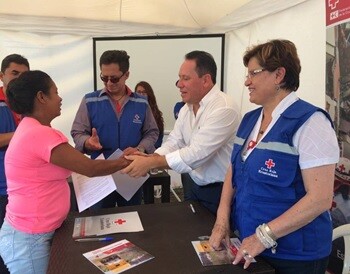
After a 7.8 magnitude earthquake struck the coastal zone of Ecuador in April 2016, entire communities found their homes damaged or completely destroyed. Approximately 385,000 people were in need of humanitarian assistance, including 70,000 people who reported severe damages to their homes.
Informal land holdings are quite common in Ecuador; in fact, about 70% of the population does not possess the necessary documentation to prove they own the land they live on. In some cases, people have inherited their land but it was never properly registered with the relevant authorities. In other instances, where land title records were in place, they were lost or destroyed due to the disaster itself.
Those who lost their homes due to the earthquake in Ecuador found themselves disadvantaged when it came to receiving assistance from the government, as reconstruction programs were only directed to formally recognized land owners. For example, the village of Coaque in Pedernales was going to be completely excluded in reconstruction programs because the entire community had irregularities in their property titles.
Furthermore, the Organic Law on Rural Lands and Ancestral Territories of March 2016 was still pending adoption, therefore communities in the rural areas affected by the earthquake found themselves in a bureaucratic limbo and unable to register their land.
It is in this context that the Ecuador Red Cross joined efforts with the Shelter and Protection Clusters and together they created the Housing Land and Property group (‘the HLP group’), to try and address these issues.
The Ecuador Red Cross had been working in collaboration with national authorities to strengthen disaster-related legislation since 2012, but this was mostly focused on the facilitation of international disaster assistance. More recently, however, the Ecuador Red Cross was able to put into practice its skills on Housing, Land, and Property issues and assumed coordination of HLP group.
The HLP group has been active in the last few months in bringing support to communities and promoting positive changes to public policy and regulations. Under the leadership of Ecuador Red Cross, the group has been advocating for the protection of HLP rights in the response and reconstruction process. This includes in the implementing regulations for the Organic Law on Rural Lands and Ancestral Territories of March 2016, to allow for the registration of informal land ownership in rural areas.
Moreover, the HLP group promoted the adoption of a new regulation to grant bona fide landowners a grace period of three months after receiving their new house, to provide all required documents to clarify their right over the land. These formalities were effectively put in place in 2016 and corresponding regulations formally adopted in January 2017.
Most importantly, the HLP group has provided direct support to communities to help them understand their rights and fulfil the administrative procedures required to be granted formal land titles. As a direct result, the village of Coaque in Pedernales became eligible to receive humanitarian assistance by the government and civil society actors.
In December 2016, the Ecuador Red Cross and the International Federation of Red Cross and Red Crescent Societies organized a regional training workshop in Ecuador to share this recent experience in supporting communities to resolve HLP issues after disasters, and build the capacity of humanitarian practitioners in this field.
The solutions developed in the response to the Ecuador earthquake were shared with sister National Societies of the region participating in the workshop. The workshop also served to institutionalize the learnings and tools developed in Ecuador for future use in other countries to support governments and communities facing similar HLP problems.